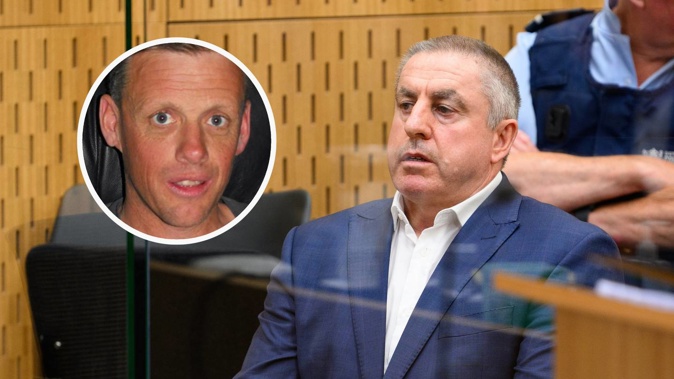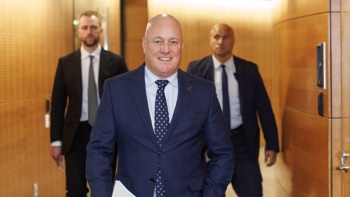
A jury considering whether a former prison guard murdered his long-time friend has been unable to reach a verdict.
The hung jury had been deliberating for 23 hours over four days in the case of David Charles Benbow, 54, standing trial for the alleged murder of Michael McGrath in 2017.
The trial at the High Court in Christchurch has heard from more than 100 witnesses over the last seven weeks. But the jury today said that it could not reach a unanimous decision and were discharged by Justice Jonathan Eaton. He thanked the jury for their service.
Benbow showed no emotion as the news emerged, nor when the hung jury walked out of court. He declined to comment to journalists outside court.
He was remanded on electronically-monitored bail and will be back in court on May 19 to decide what happens next with his case.
/cloudfront-ap-southeast-2.images.arcpublishing.com/nzme/XECHZXXHMBAQJGSG7Z5L5JZKO4.jpg)
David Benbow leaves the High Court at Christchurch after a hung jury in his trial. Photo / George Heard
McGrath’s brother, Simon McGrath, said he was “disappointed” the jury was unable to reach a verdict.
Friends and family members, including McGrath’s parents Adrienne and Kevin, his brother Simon, as well as Benbow’s mother and brother, had packed into courtroom 12′s public gallery alongside Operation Renovation detectives for the tense moment.
The jury of seven men and five women began its deliberations at 12.48pm last Wednesday, coming back each day to resume their task and breaking for the weekend.
In addressing the jury before they began their closed-door discussions, Justice Eaton reminded them that it was a “trial by jury, not trial by experts”.
They returned with several questions over that period including a clarification over what constitutes “reasonable doubt”.Justice Eaton told them that the Crown would only have met the beyond reasonable doubt threshold if they were “sure Mr Benbow is guilty of murder”. And on Monday morning, the jury had another query, this time telling the judge that they were having difficulty in reaching a unanimous verdict.
/cloudfront-ap-southeast-2.images.arcpublishing.com/nzme/O6UJ4ITUJ5FI7LZGL32IQYLO5M.jpg)
David Benbow and his lawyer, Marc Corlett KC (right), leave the High Court at Christchurch. Photo / George Heard
Justice Eaton gave them a majority verdict direction, saying that if they reached a point where 11 of them agreed, with one juror disagreeing, then they could proceed to a verdict. However, he said if they didn’t have at least 11 in agreement, they could not come to a decision.
But after 23 hours, they were still at an impasse and the hung jury decision was made.
Justice Eaton said there would “likely” be another trial. The judge also thanked both sets of lawyers in what he acknowledged has been a “long and difficult trial” where everyone worked extremely hard to present a complicated case to the jury and “everyone will be sharing in a sense of frustration” that it hasn’t resulted in a conclusion today.
The Crown had alleged that Benbow lured McGrath to his semi-rural lifestyle property in Halswell on Monday, May 22, 2017 and used his .22 semi-automatic rifle, with suppressor and sub-sonic ammunition, to shoot him dead, just weeks after telling a counsellor he wanted to “annihilate” him.
McGrath’s body has never been found despite widespread searches of properties, rivers, waterways, and the city dump since he vanished.
A missing persons investigation – which became a homicide probe within days – was launched when McGrath, a fastidious carpenter, failed to show up for a weekly dinner appointment with his brother and mother.
David Charles Benbow denies murdering Michael McGrath and is standing trial at the High Court in Christchurch. Photo / George Heard
Benbow became a person of interest after it emerged that he was the last person to see McGrath when he visited his Checketts Ave house on Sunday, May 21, 2017 to ask him for help shifting some heavy railway sleepers the next morning.
But Benbow has always professed his innocence, saying that McGrath never turned up that morning, putting it down to a hard frost, and after waiting a while went to a counsellor’s appointment in the city at 10.15am.
During the trial, his lawyers claimed that the police had “investigative bias” and “tunnel vision” from early in its investigations.
With no body, no murder weapon, and little forensic evidence, the Crown, meanwhile, had relied on a circumstantial case.
/cloudfront-ap-southeast-2.images.arcpublishing.com/nzme/CSUEDVPHZBDMVLOH65ZNYRCMYU.jpg)
The trial has been heard at the High Court in Christchurch over the last seven weeks. Photo / Kai Schwoerer, Stuff, Pool
In his closing address on Tuesday, lead defence counsel Marc Corlett KC told the jury the question of whether McGrath turned up at Benbow’s home or not on the morning of May 22 was at the crux of the case.
“If Mr McGrath did not come around to Mr Benbow’s house that Monday morning, then Mr Benbow is in no better position than anyone else in this room to tell what has become of Mr McGrath,” he said.
He went through three aspects of the Crown’s case - power usage records which he said poured doubt over whether McGrath was actually at home at the time the Crown says he was killed kilometres away; CCTV evidence that allegedly showed McGrath driving towards Benbow’s house; and a key Crown witness’ sighting of two men matching the descriptions of McGrath and Benbow on the morning of the alleged murder.
“The Crown case is on fire in the dumpster; the electricity evidence they relied on is wrong, wrong, wrong,” Corlett said.
“The only way [the Crown] can deal with that problem is hurl a grenade in that dumpster fire and pretend none of that happened.”
Corlett also asked the jury why McGrath would actually go around to Benbow’s house, and if he did, why would he go in his car and park outside on the grass verge.
“The Crown case is much like a cheap easter egg - once you pinch through opportunity it’s hollow in the middle and the bits of the shell just start crumbling into a pile,” he said.
Corlett said Benbow did not “suddenly go from a big softy to a super ninja” thanks to a few days training as a Corrections officer.
In explanation to several questions, such as why there was no forensic evidence, Corlett said there was another reason.
“Mr McGrath never showed up that morning and Mr Benbow did not kill him.”
Crown prosecutor Barnaby Hawes in his closing address on Monday told the jury that Benbow had a “very clear and obvious motive” to harm McGrath.
One of his children had told him that they had seen Green kissing McGrath just a few weeks earlier.
A week before McGrath vanished, the private security camera system at Benbow’s property had been turned off, the court heard, and the Crown said that was no coincidence.
“Mr Benbow is either responsible for Mr McGrath’s disappearance or the victim of an unlikely and otherwise inexplicable combination of circumstances,” Hawes told the jury.
“It’s not lightning striking twice in the same place. This is lightning striking in the same place over and over again.”
The Crown claimed that he had the motive, means and opportunity to carry out the killing.
Take your Radio, Podcasts and Music with you

/cloudfront-ap-southeast-2.images.arcpublishing.com/nzme/RZF6MC7I2JEKPOMVXBCQJXSNNI.JPG)








